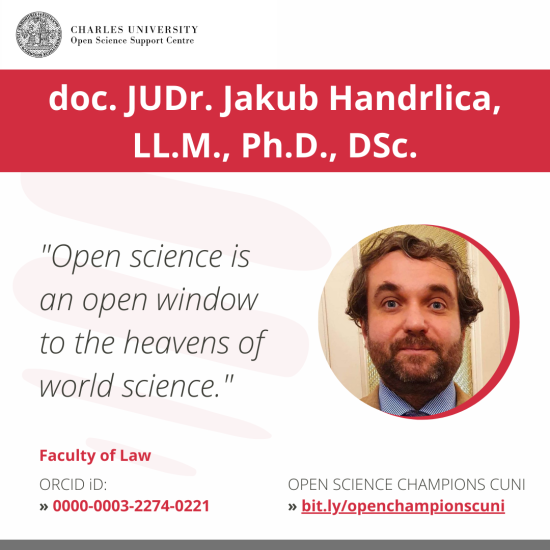 Department of Administrative Law and Administrative Science
Department of Administrative Law and Administrative Science
Faculty of Law
ORCID: 0000-0003-2274-0221
ResearcherID: O-5855-2018
Scopus Author ID: 57119963900
For many years now, a seminar on how to succeed in grant activities has been held at the Faculty of Law. Professor Kysela, an associate professor at the time, now a full professor, presented at this seminar and spoke in an interesting way about the importance of the H-index. I was very interested in what he had to say, and I must admit that I couldn’t get the idea of achieving even a small H-index out of my head. But how does one get recognition in the international sphere and cited, even in indexed periodicals? Such was my path to open science, because only publishing in the form of open science creates opportunities for an author to be cited anywhere in the world – but also to be subjected to criticism or correction by anyone.
I am and have been in the past an investigator for several GAČR grants, and as a result, have published in high impact journals, which are based on open access. These include, in particular, the Journal of World Energy Law and Business. Quite recently, I managed to publish in the Review of European, Comparative and International Environmental Law, which is in the first quartile. I, therefore, consider open science to be an integral part of my academic work and an ideal tool for making my results visible and available throughout the world.
Today’s science is a space without borders. For several decades now, this has not only been true for disciplines in the natural sciences, but also for various disciplines relating to law. Even in the legal sciences, excellence cannot be achieved without reflecting international trends in academic discourse, but even if international discourse does not reflect our results. Open science is an ideal way to keep up with the discourse of the international academics, but also to ensure that our work is cited abroad and achieves international recognition.
I would advise them what is important to me, especially for my PhD students – to mainly target foreign indexed periodicals that are registered either in the Scopus database or in WoS and that normally use open access. It is not an easy path. Each author must overcome a number of difficulties and many times even a number of rejections. However, in the world of global academics, this is the only way to contribute to global discourse and succeed at an international level.
In particular, you must abandon the race to achieve the highest number of publications, which usually ends up being dozens to hundreds of entries in various obscure journals and anthologies. The goal should be – and this should be our understanding of science – to publish in the most prestigious indexed journals that work with open access. In the legal sciences, however, this requires a shift in the overall ethos of science and – to a large extent – a generational change.
Open science is an open window to the heavens of world science.

Residency, Invoicing and Correspondence Address
Charles University
Central Library
Ovocný trh 560/5
116 36 Prague 1
Czech Republic
Office Address
José Martího 2 (2nd floor)
160 00 Prague 6
Phone: +420 224 491 839, 172
E-mail: openscience@cuni.cz
Www: openscience.cuni.cz